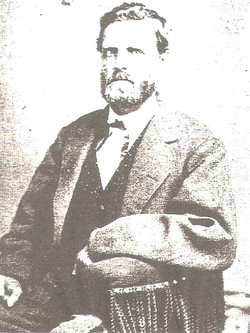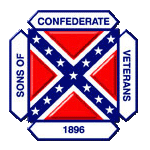
JOHN CRAWFORD VAUGHN
February 24, 1824—September 10, 1875
John Crawford Vaughn was born in Roane County, TN on February 24, 1824. One source states he was born in Grayson County, VA and a state marker says he was born in Madisonville. His military service included the Mexican War where he served as captain of the 3rd Tennessee Infantry.
He also organized and formed, as its first commander, the 3rd Tennessee Infantry, C.S.A. whose first action was the first Battle of Manassas, although he was present at the bombardment of Fort Sumter, SC on April 12, 1861. He returned to his home in Monroe County to recruit his regiment, the 3rd Tennessee Infantry. He was promoted to brigadier general and was captured at Vicksburg on July 4, 1863 and on a prisoner exchange, later commanded the cavalry brigade which escorted President Jefferson Davis on his flight from Richmond .
Seven East Tennessee regiments would serve under him: the 3rd, 31st (changed to 39th after Vicksburg), 43rd, 59th, 60th, 61st and 62nd Tennessee Infantry regiments. His 3rd Regiment would find itself one of the first in the field along with the 1st Tennessee under Colonel George Maney, being in Northern Virginia two days prior to Tennessee’s state-wide vote on secession.
After the 1st Battle of Manassas, and in operations of the Valley of Western Virginia, before coming back to Tennessee to serve under General Edmund Kirby in protecting the Department of East Tennessee, he was promoted to brigadier general on September 22, 1861, and given command of the Brigade composed almost entirely of Upper East Tennesseans, and along with Reynold’s Brigade, transferred to Mississippi away from the distractions of Unionists at home. The two brigades arrived in Mississippi a month or two apart and would later be part of the Siege of Vicksburg, which was disastrous for Southern forces.
Although after the debacle at Vicksburg, he was thought by his superiors to be better suited to command at the regimental level, he had no equal when it came to leading his mounted East Tennesseans, who were most unique in their sympathies of any the Confederacy could place in the field. But late in the war, Vaughn had rid the brigade of Union sympathizers and had men fully dedicated to the Southern Cause. Defeat for them meant more than the loss of rights or other reasons men chose to protect the South. It would mean never being able to return home, or returning to a situation where their mortal enemies would be their lords, with the option of denying them not only their property and rights, but perhaps their lives.
His East Tennesseans were some of the last to lay down their arms and flag, surrendering over a month after General Lee’s surrender at Appomattox. It would mean to them they had no place to go if they gave up. Those men remaining with General Vaughn reflected his dedication and their defense and loyalty to the South were never questioned.
At Bulls Gap, he had the considerable thrill of helping stampede General Alvin C. Gillem of the 13th Tennessee Volunteer Cavalry and his hated bushwhackers after being stampeded a month before by Gillem.
The men of Vaughn’s Brigade would fight many skirmishes and battles before finally laying down their arms. Vaughn’s Brigade, while serving under General Jubal Early, would not give up, even after General Lee. When ordered to disband and go home, Vaughn’s East Tennesseans would not. They chose instead to cross the mountains into North Carolina and join with General Joseph E. Johnston and his Army of Tennessee. After finding out Johnston had also surrendered, Vaughn and his men rode on, joining up with President Jefferson Davis and his cabinet, forming part of the escort on their attempt to escape capture. These men were riding with their enigmatic general one full month after Lee’s surrender.
Dr. Byrd D. Maynard of Vaughn’s Brigade gives the following account: “At the time of General Lee’s surrender, General Vaughn’s troops were encamped east of New River, VA. The bitterness of the disappointment, consequent on this reverse, was told in the tears that coursed the cheeks of these veterans, and the groans and sobs to be heard throughout the encampment. ‘Can all be lost?’ was agonizingly inquired, and as earnestly answered by the patriotic brave: ‘No, not as long as our flag is to the breeze.’ Now came the crucial test. “Join Johnston and the Confederate authorities in NC,’ came the order. This was leading fathers away from their homes, husbands from their wives, for further periling of life without the possibility of success. But while other troops refused to obey the order, regarding further resistance as suicidal, East Tennesseans, without exception turned toward Charlotte, NC. They could not do otherwise. They had enlisted for the War. The Cause was not less dear than when victory crowned Southern arms with most brilliant successes. True to their first assurances of adherence to the Confederacy, they rendezvoused at Charlotte. Here were assembled Mr. Davis, his cabinet, and such forces as were necessary for protection of them. Suspense-crushed. In a few days there was added to Lee’s surrender that of Johnston! Only the Trans- Mississippi Department remained unconquered. And yet the majority of these noble cavaliers still stood by their flag. In company with others they became by the circumstances a “national bodyguard” for Mr. Davis and his cabinet from Charlotte to Abbeville, SC. And not until after the last counsel had been held; not until the Confederate Cabinet had ceased to perform the functions of such high relation; not until those who had been in authority said, ‘Your obligations to the Confederacy are no longer binding—you can do no more; ‘not until then, did those noble few fold their flag and retire from the field…..
Source: Home-Growed Rebels by William D. Taylor
February 24, 1824—September 10, 1875
John Crawford Vaughn was born in Roane County, TN on February 24, 1824. One source states he was born in Grayson County, VA and a state marker says he was born in Madisonville. His military service included the Mexican War where he served as captain of the 3rd Tennessee Infantry.
He also organized and formed, as its first commander, the 3rd Tennessee Infantry, C.S.A. whose first action was the first Battle of Manassas, although he was present at the bombardment of Fort Sumter, SC on April 12, 1861. He returned to his home in Monroe County to recruit his regiment, the 3rd Tennessee Infantry. He was promoted to brigadier general and was captured at Vicksburg on July 4, 1863 and on a prisoner exchange, later commanded the cavalry brigade which escorted President Jefferson Davis on his flight from Richmond .
Seven East Tennessee regiments would serve under him: the 3rd, 31st (changed to 39th after Vicksburg), 43rd, 59th, 60th, 61st and 62nd Tennessee Infantry regiments. His 3rd Regiment would find itself one of the first in the field along with the 1st Tennessee under Colonel George Maney, being in Northern Virginia two days prior to Tennessee’s state-wide vote on secession.
After the 1st Battle of Manassas, and in operations of the Valley of Western Virginia, before coming back to Tennessee to serve under General Edmund Kirby in protecting the Department of East Tennessee, he was promoted to brigadier general on September 22, 1861, and given command of the Brigade composed almost entirely of Upper East Tennesseans, and along with Reynold’s Brigade, transferred to Mississippi away from the distractions of Unionists at home. The two brigades arrived in Mississippi a month or two apart and would later be part of the Siege of Vicksburg, which was disastrous for Southern forces.
Although after the debacle at Vicksburg, he was thought by his superiors to be better suited to command at the regimental level, he had no equal when it came to leading his mounted East Tennesseans, who were most unique in their sympathies of any the Confederacy could place in the field. But late in the war, Vaughn had rid the brigade of Union sympathizers and had men fully dedicated to the Southern Cause. Defeat for them meant more than the loss of rights or other reasons men chose to protect the South. It would mean never being able to return home, or returning to a situation where their mortal enemies would be their lords, with the option of denying them not only their property and rights, but perhaps their lives.
His East Tennesseans were some of the last to lay down their arms and flag, surrendering over a month after General Lee’s surrender at Appomattox. It would mean to them they had no place to go if they gave up. Those men remaining with General Vaughn reflected his dedication and their defense and loyalty to the South were never questioned.
At Bulls Gap, he had the considerable thrill of helping stampede General Alvin C. Gillem of the 13th Tennessee Volunteer Cavalry and his hated bushwhackers after being stampeded a month before by Gillem.
The men of Vaughn’s Brigade would fight many skirmishes and battles before finally laying down their arms. Vaughn’s Brigade, while serving under General Jubal Early, would not give up, even after General Lee. When ordered to disband and go home, Vaughn’s East Tennesseans would not. They chose instead to cross the mountains into North Carolina and join with General Joseph E. Johnston and his Army of Tennessee. After finding out Johnston had also surrendered, Vaughn and his men rode on, joining up with President Jefferson Davis and his cabinet, forming part of the escort on their attempt to escape capture. These men were riding with their enigmatic general one full month after Lee’s surrender.
Dr. Byrd D. Maynard of Vaughn’s Brigade gives the following account: “At the time of General Lee’s surrender, General Vaughn’s troops were encamped east of New River, VA. The bitterness of the disappointment, consequent on this reverse, was told in the tears that coursed the cheeks of these veterans, and the groans and sobs to be heard throughout the encampment. ‘Can all be lost?’ was agonizingly inquired, and as earnestly answered by the patriotic brave: ‘No, not as long as our flag is to the breeze.’ Now came the crucial test. “Join Johnston and the Confederate authorities in NC,’ came the order. This was leading fathers away from their homes, husbands from their wives, for further periling of life without the possibility of success. But while other troops refused to obey the order, regarding further resistance as suicidal, East Tennesseans, without exception turned toward Charlotte, NC. They could not do otherwise. They had enlisted for the War. The Cause was not less dear than when victory crowned Southern arms with most brilliant successes. True to their first assurances of adherence to the Confederacy, they rendezvoused at Charlotte. Here were assembled Mr. Davis, his cabinet, and such forces as were necessary for protection of them. Suspense-crushed. In a few days there was added to Lee’s surrender that of Johnston! Only the Trans- Mississippi Department remained unconquered. And yet the majority of these noble cavaliers still stood by their flag. In company with others they became by the circumstances a “national bodyguard” for Mr. Davis and his cabinet from Charlotte to Abbeville, SC. And not until after the last counsel had been held; not until the Confederate Cabinet had ceased to perform the functions of such high relation; not until those who had been in authority said, ‘Your obligations to the Confederacy are no longer binding—you can do no more; ‘not until then, did those noble few fold their flag and retire from the field…..
Source: Home-Growed Rebels by William D. Taylor


